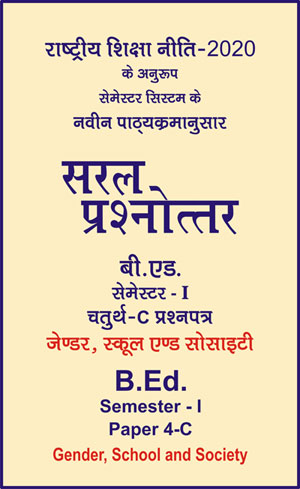|
बी एड - एम एड >> बी.एड. सेमेस्टर-1 प्रश्नपत्र-IV-C - जेण्डर, स्कूल एण्ड सोसाइटी बी.एड. सेमेस्टर-1 प्रश्नपत्र-IV-C - जेण्डर, स्कूल एण्ड सोसाइटीसरल प्रश्नोत्तर समूह
|
|
||||||
बी.एड. सेमेस्टर-1 प्रश्नपत्र-IV-C - जेण्डर, स्कूल एण्ड सोसाइटी (अंग्रेजी भाषाा में)
Chapter 11 - Overviewing of girl's education in India with special reference to U.P.
Question- Which schemes are being run in the field of progress of primary education in Uttar Pradesh?
Related Short Answer Questions
-
What is the mid-day meal scheme?
-
What is the objective of District Primary Education Project?
Answer -
Plans for Progress in the Field of Primary Education
Operation Black Board was started in 1986-87. Its objective was to provide adequate facilities and at least two teachers and necessary teaching materials to the primary schools. In 2000-01, a budget of Rs 10378 lakh was passed for this scheme.
The objective of the Education Guarantee Scheme was to open education centres called Vidya Kendras in educationally underserved areas, where there should be at least 30 children in the age group of 6 to 11 years. In these centres, Panchayats appoint teachers on contract and space is made available for the centre at the community level.
The mid-day meal scheme launched by the Central Government is a scheme to encourage students for education, under which every child of a recognized primary school is given food grains per month on the basis of minimum certified attendance.
Kasturba Gandhi Balika Vidyalaya (K.G.B.V.) : This scheme was implemented in 25 areas to improve the education of girls of rural and backward areas. Under this, 31 K.G.B.V schools were opened, out of which 7 schools were opened with the help of NGOs. This scheme was run for those children, whose education has been left out in the middle.
Sarva Shiksha Abhiyan : This scheme started by the Government of India in the year 2001-02 was run in 16 districts of Uttar Pradesh and from 2002-03, this scheme was implemented in all the districts. Till 30 September 2005; 8957 new primary schools and 12167 new junior high schools were opened under this scheme. In this scheme, construction and repair of school buildings, training of teachers, necessary resources and reading material have been included, in which free school bags, school uniforms and books are also given to the children.
Basic Education Project (I & II) : The State Government with the help of World Bank started the UP Basic Education Project-I in 17 districts of Uttar Pradesh in 1993. Its objective is universal primary education. UPBEP-II was launched to meet the needs of schools, teachers and teaching rooms in these 17 districts. These needs arose out of the increase in enrolments.
District Primary Education Project (D.P.E.P.-II) - This scheme was started in 1997 in 18 districts. Its aim was to provide universal primary education. The goal of this scheme is to increase access to education, increase school retention rate, improve quality and build institutional capacity.
Specific Goals :
To reduce the gap between gender and social groups in enrolment, drop out and educational achievement from 5 per cent to 2 per cent.
Reducing the average dropout rate at the primary level to less than 10%.
To increase the average achievement level estimated at the base estimate level by at least 25 per cent.
UNICEF Supported Primary Education Project : A joint UN project has been launched in the state which will complement the DPEP through programs like engaging education for boys and girls in specific areas. In addition, a UNICEF-supported project has been launched. It will run in 6 districts of the state which are not included in DPEP III.
Shiksha Mitra Scheme : The state has started Shiksha Mitra or ArdhShikshak scheme under which 10+2 passed youths can be appointed as ArdhShikshak. Half of these appointments will be of women. Under this scheme, local educated persons are appointed at Rs.1450 per month.
|
|||||

 i
i 









